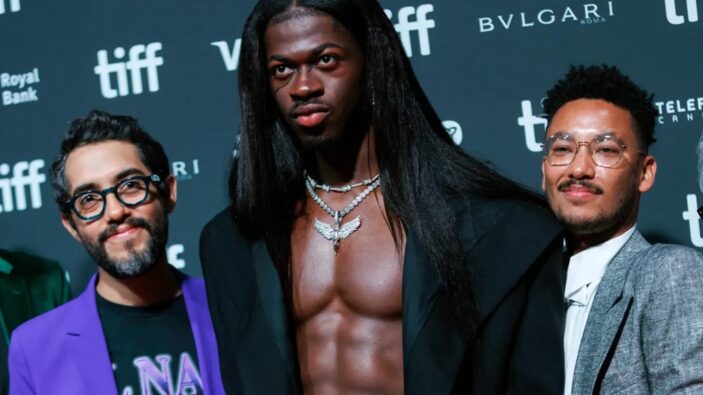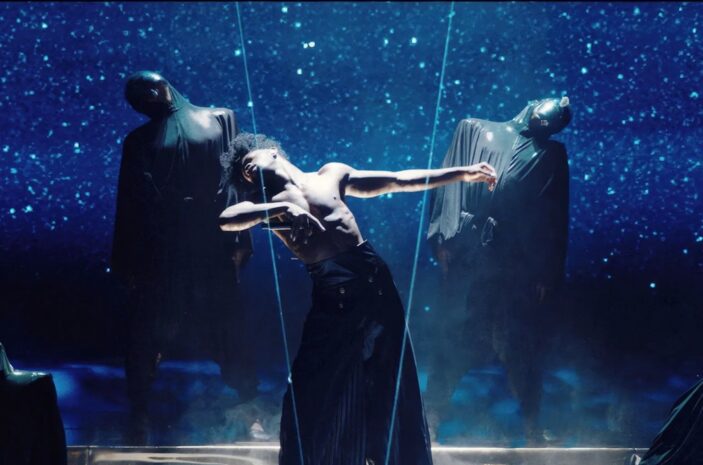
Directed by Academy Award-nominated filmmaker Carlos López Estrada and Academy Award nominated director and cinematographer Zac Manuel, Lil Nas X: Long Live Montero follows the Grammy-winning and trailblazing, rapper, singer, songwriter, Lil Nas X, over 60 days as he embarks on his first ever tour across North America on his debut album tour Long Live Montero.
The all-access documentary is an intimate portrait of an artist navigating identity, family, expectations and acceptance, all while reflecting on his place within the legacy of Black, queer performers. We see Lil Nas X connect with us in his most personable way yet and uncover his personal experiences, from being raised as a black queer performer in the deep south, through to his rise to fame, and his place in the pop world as a 23-year-old artist.
To coincide with the film’s digital release in Australia, Peter Gray spoke with Zac Manuel about his personal involvement with the production, what truly surprised him about the superstar performer, and how not even a bomb threat at the film’s world premiere could dim Lil Nas X’s ultimate shine.
I think it’s so great to have someone like Lil Nas X thriving in the industry. I think it’s so important to have openly queer artists in this time. It still feels quite rare. In the film he speaks of the importance of music and what it means to him. I was wondering, for yourself, is there an artist personally that speaks to you? That provides the importance of escape?
Outside of his music? Ah, I mean there’s so many different artists. Serpentwithfeet. I’m a big fan of Miles Davis and Angel Olsen. I can’t think of a particular song. Boygenius. I don’t know. I like a lot of different things. I’ve been listening to a lot of Big Thief. I’m not from Brooklyn, but my tastes are sometimes a little bit Williamsburg. That’s kind of been my playlist.
And how did you and Carlos (López Estrada co-director) become involved in making this film?
Carlos was one of the writers of the stage show. Maybe two or three months before the events of the film, Carlos was helping to write and craft the narrative structure for the show, and then he came back on the (film) about halfway through production to re-envision what filming the show would look like. I came on to the production pretty close to the time when the tour (Long Live Montero) was about to go on the road.
When I was brought in I was asking, “What movie is this? What’s the story?” In (the film) obviously he’s going on tour, but that’s only scratching the surface of what we wanted to explore and what story we wanted to tell. So, I came in a little bit late to the process, I guess you could say, when they were in the midst of rehearsals and hadn’t gotten on the road yet. So I kind of jumped into the fire and started making the movie.
Because you and Carlos are co-directing this, is there a certain dynamic that you’re navigating? Do you have individual ideas that you separately explore and then come together? Or is everything a joint process?
So, sometimes there would be some top-line items. Like, I was spending most of my time with Montero or his team, so my items were “Who from his family can we talk to? How can we explore the relationship he has with his brothers?” Another really important item for us was to be able to firmly place his fans into this narrative, so Carlos came up with the genius idea of doing those testimonials at some of the (live) shows. It wasn’t just “Oh, tell us what your favourite song is?” He wanted to really explore what this transformation would look like. And I should say by transformation, I mean if we’re telling a story there are certain things that we know we want to talk about, and then there’s other stuff we’re kind of figuring out and playing with the pieces we have. Playing within our sandbox,
We have fans and we have some family coming in, so how can we talk about transformation? We were kind of thinking in our own realms. If I was going to be with Montero, (then) Carlos was going to be more focused on the show and the fans. So, within our realms, we’re looking at different ideas and concepts of transformation that we can kind of pull out and talk about. And we would have conversations about that.

Was there anything that truly surprised you about Nas the more time you spent with him?
Yeah, I mean, one of the first times I went to his house, I didn’t know what to expect. I don’t often work with people who are famous in the way he’s famous. A lot of the work I do is more in the criminal justice or social justice space, so it was new territory for me. But I knew I wanted to explore, and I remember going into his bedroom, and he’s got this big wall – which you see in one of the earlier scenes in the film – and, first of all, who has access to a printer? (Laughs) And second of all, who’s printing out and constructing (that)? What does that process even look like? But in the middle of all of these absurdist internet memes is a picture of Marsha P. Johnson, and to put (them) in the centre of all of that is, I think, really interesting.
I didn’t expect him to have that. I think it showed a deeper level of consciousness and acknowledgement of his legacy and where he came from. That kind of shifted the way I was thinking about him and the way I was thinking about telling the story. That was a really big surprise, and a very pleasant surprise. I think it helped to start to define some of the questions we could ask and the way we could tell this story.
Was he quite open to the process?
(Laughs) I mean, yeah….He wasn’t like, “No, this is whack!” There was never a situation like that. I just think a lot of things were a balancing act of timing and schedule and logistics. I think one of the processes of making films is kind of narrative transparency. I think what we made sure to do is always talk to him about why we were making the decisions that we were making. Why we wanted to do a certain setup. Why it was important to talk about a specific thing. Why it was important to talk to a specific family member. There was no surprises for him. But I think it also just allowed him to understand what our intentionality was. To be, like, “This is important.” To show what fits into the larger idea of the film in this way. That’s how we tackled that.
And you premiered the film at last year’s Toronto International Film Festival. Was there always the intention of showing the film at such an event? How did TIFF come about for you?
I can’t remember exactly the details. It was a dash of trying to get the film finished in time though. I’ll say that. I don’t want to misquote anything or give the wrong details, but I know it really came up against the line of “Are we going to be able to make the deadline that we need to in order to get them the DCP so they can actually show the film and announce it?” We had to do press and marketing for it, so it was really close to when we knew we wanted to do festivals, but we weren’t exactly sure which one.
But some powers at play were able to facilitate, and they really loved the film, so it was kind of a perfect match. Unfortunately, we had a bomb threat, which was crazy! It really goes to show that we as a society aren’t as accepting as we think we are of people with different identities. And that’s unfortunate. But, I will say, the screening itself went beautifully. The crowd reaction was really great. We sold out, I think, 1700-seat theatres both times… so it was great. It was really special to be able to show it to audiences, because I think the film feeds and inspires energy in a big audience because it’s so musical. It’s lyrical. It’s bombastic. It was really special to have a big audience just have fun with it outside of all the other films playing, which are mostly very serious. Our film is a joyful watch.

Yeah, the bomb threat really, unfortunately, reiterates that there’s still a way to go with tolerance. But I did love that Nas addresses that in the film in his own way. There’s a whole heap of protestors outside one of his concerts and he combats that with sending them out pizzas to eat. It’s an amusing way of breaking through the bullshit and saying that the detractors won’t win.
He’s got an incredible ability to use his humour to actually empower the trolls and the homophobes. He really weaponizes it in the best way possible.
I went into the film knowing his music, but I didn’t really know much about him, so it was really great to see that relatability. I always appreciate being opened up to figures and seeing who they really are. And it really comes across like what we see with him is what we get.
I think I entered into this story much in the same way you did. I listened to his music, and I really liked his record Montero, (but) I didn’t know that much about him. I didn’t even follow him on social media until after we premiered. I came into this with a lot of questions and open eyes and ears. What do we see? What do we hear? Who is he? What makes him tick? What makes him spin? What does he create? What inspires him? What turns him off? I mean, no one controls his social media, so what you see is what you get. He is kind of an open book in a certain way. He really just lays it out.
If he’s feeling bad, or if he’s feeling great, he’ll tell you about it. And he’s excited to tell you about it as well. So it was really nice to be able to work with someone who has such emotional depth and intelligence. And, to add to that, a lot of that comes from him as well, like his team and everybody that he works with. They’re all so familiar and so generous with their time. I think he just cultivates this atmosphere of extreme generosity and kindness. And it was always like that, which was a little bit of a shock. A shock in the softest way possible, like, “Oh, this is actually a joyful space to work in.”
Lil Nas X: Long Live Montero is now available to rent or purchase digitally in Australia.
